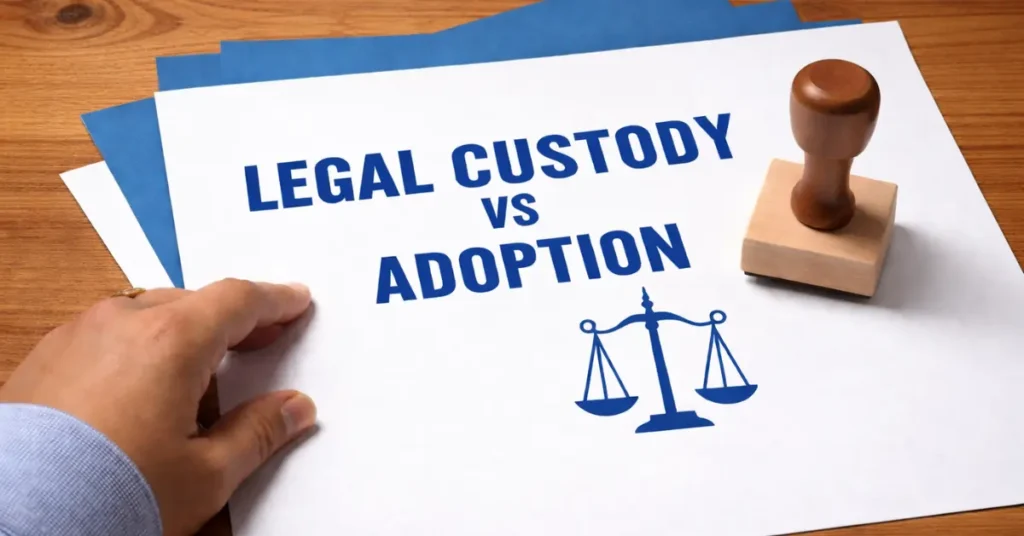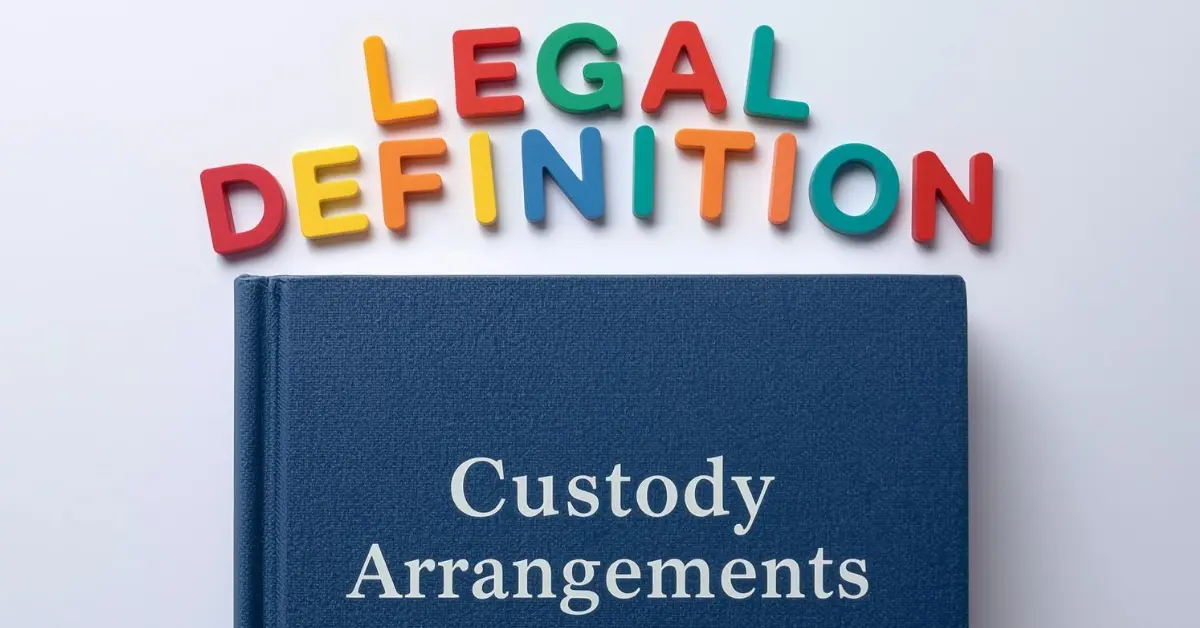With over 2.7 million grandparents in the United States actively raising their grandchildren, the need for guidance on legal and emotional aspects of this arrangement has never been greater.
Often driven by unforeseen family circumstances, grandparents step in to provide stability, security, and a nurturing environment. This challenging but essential role may start informally but can quickly become a full-time commitment, where legal and emotional responsibilities blur.
One pressing question often arises for grandparents: Should they adopt the grandchildren they’re raising?
Adoption is a pathway to ensuring both legal rights and a stable, long-term home for children, but it also brings complex emotional and legal considerations.
For grandparents considering this option, understanding the differences between legal custody, temporary guardianship, and adoption is essential.
Legal Custody vs. Adoption: What’s the Difference?
In family law, understanding the differences between legal options can provide clarity and help grandparents make informed decisions.
Legal Custody
Legal custody grants grandparents the authority to make decisions regarding their grandchildren’s health, education, and general welfare. However, unlike adoption, it doesn’t sever the biological parents’ legal rights.
Custody can often be temporary, depending on the parents’ circumstances, and can be reversed if conditions change.
Temporary Guardianship
Temporary guardianship is often a stepping stone, providing grandparents with the rights to make certain decisions on behalf of their grandchildren without full legal responsibility.
It is ideal for short-term arrangements or when there’s potential for the child to reunite with their biological parents. Unlike adoption, guardianship doesn’t create a permanent family structure and often requires periodic court reviews.
Adoption
Adoption provides a permanent solution, effectively making grandparents the legal parents of their grandchildren. This step terminates the biological parents’ rights and offers legal stability.
In practical terms, adoption allows grandparents to manage all aspects of their grandchildren’s lives, from medical care to educational decisions and beyond.
Adoption is a commitment with benefits and challenges. It can bring emotional stability but also impacts family dynamics by legally changing relationships within the family.

Pros of Adopting Grandchildren
For grandparents, adoption offers both peace of mind and concrete benefits.
Stability and Security
Stability is critical for children, especially those who have faced family trauma or upheaval. Adoption ensures that grandchildren have a consistent and secure home, reducing the uncertainty that can arise from temporary custody arrangements. For grandparents, adoption provides the legal authority to make decisions confidently.
Educational and Healthcare Access
Adoption clarifies who can make medical decisions and access records for school and healthcare. Grandparents who adopt can more easily navigate the educational system, from school enrollment to special education needs. It also facilitates a smoother process in seeking medical treatment, as they are recognized as the child’s legal parents.
Financial Benefits
Adoption opens doors to various forms of financial assistance. Programs like adoption assistance and kinship care support are available in many regions, offering resources that may be restricted for non-adoptive caregivers. Grandparents may also receive additional social security benefits or inheritance rights for their grandchildren, making it easier to plan for the future.
Cons and Considerations
While adoption offers clear benefits, it is equally important to consider the potential challenges.
Emotional Impacts on Family Dynamics
The emotional impact of adoption can be profound. For some children, this formal change can bring stability, while others may struggle with identity and loyalty conflicts. For grandparents, adopting can redefine their role within the family, sometimes leading to strained relationships with the biological parents.
Financial Responsibility
Adoption legally transfers full financial responsibility to the grandparents. Without the possibility of child support from the biological parents, this can lead to significant financial strain, especially for elderly caregivers living on fixed incomes. Adoption is a permanent commitment, making it essential to consider the long-term financial impact.
Aging Considerations
Age and health are significant factors for grandparents contemplating adoption. The long-term responsibilities of raising a child can be challenging for older caregivers, impacting both the child’s care and the grandparents’ health. Planning for the future, such as arranging alternative care if health issues arise, is a crucial step.
Comparison Table of Legal Custody, Temporary Guardianship, and Adoption
| Aspect | Legal Custody | Temporary Guardianship | Adoption |
|---|---|---|---|
| Decision-Making Rights | Limited | Limited | Full |
| Financial Impact | Some assistance | Limited assistance | Access to benefits, grants |
| Permanence | Reversible | Temporary | Permanent |
| Legal Involvement | Less intensive | Moderate | High |
| Emotional Adjustment | Medium | Medium | High |
| Cost | Moderate | Low | High |
This table provides a quick view of how adoption, custody, and guardianship differ in terms of responsibilities, rights, and implications. This can help grandparents consider which route best supports their family’s needs.

Common Emotional and Practical Challenges in Raising Grandchildren
Raising grandchildren can bring unique joys and challenges. For grandparents considering adoption, the decision entails emotional, legal, and practical aspects that influence not only their lives but the family as a whole.
Kinship care, or the role of grandparents and other family members raising children, has increased in the U.S. and Canada. Understanding the emotional and practical hurdles can help grandparents make the best decision for themselves and their grandchildren.
Role Shifts and Family Dynamics
Transitioning from grandparent to parental role can strain family relationships. Grandparents may feel an increased sense of responsibility, which can be both rewarding and challenging.
Emotional support becomes essential for both the child and the grandparents, as they navigate new family dynamics. Family conflict may arise, especially if the biological parents are involved, making it crucial to maintain clear boundaries and open communication.
Legal and Financial Challenges
Legal adoption often grants permanent guardianship and parental rights, but the process is more complex than temporary custody. Adoption entails court fees, attorney fees, and often a home study to ensure a safe environment.
Compared to guardianship, adoption is a legally binding decision, which could have financial repercussions, including eligibility for government benefits. Grandparents often need financial support or assistance, making it essential to explore all available resources.
Emotional Burdens and Caregiving Stress
The decision to adopt can be emotionally taxing. Many grandparents find that the caregiving responsibilities, especially as they age, add to parenting stress. They might benefit from support groups, family counseling, or the advice of a therapist to process these feelings.
Community resources can provide a safe space to discuss challenges, share strategies, and connect with others who understand the unique circumstances of grandparents raising grandchildren.
Steps for Moving Forward with Adoption
If you’ve decided to move forward with adoption, it’s essential to understand the legal process, as well as prepare emotionally for this life-changing decision. Here are the steps that can help you transition smoothly:
- Contacting an Adoption Attorney
Start by consulting an adoption attorney experienced in family law. They can guide you through the necessary legal steps, including filing an adoption petition and representing your interests in family court. An attorney can also clarify complex issues, such as how adoption differs legally from temporary guardianship or custody.
- Preparing Required Documentation
Adoption requires a significant amount of documentation, including background checks, proof of income, and sometimes medical records. Adoption paperwork is rigorous, as it ensures that the child’s welfare is protected throughout the process. You may need to provide proof of relationship to the child and demonstrate your capability to care for them.
- Understanding Family Court Procedures
The adoption process typically involves court appearances, where a judge reviews the petition and hears testimonies from involved parties. Court hearings can be emotionally challenging, especially if there are family disputes regarding adoption. A case worker or social worker might conduct a home study to assess the suitability of your household.
- Emotional Preparation and Family Counseling
Adoption impacts the entire family, including extended family members. Family counseling is often recommended to help everyone adjust to the new family structure. This preparation can smoothen the transition, helping all parties emotionally adjust to the changes. Transition planning is especially beneficial for the child, as it helps them understand and accept their new, permanent family role.
Conclusion
The decision to adopt a grandchild is deeply personal and should be made with careful consideration. Professional guidance from an adoption attorney, support resources like family counseling, and a network of social services can provide essential support.
Grandparents should weigh both the legal and emotional factors to make an informed choice that prioritizes the best interests of the child.
Ultimately, the decision should support both the grandparent’s and the child’s well-being, providing stability, love, and security within the family.




